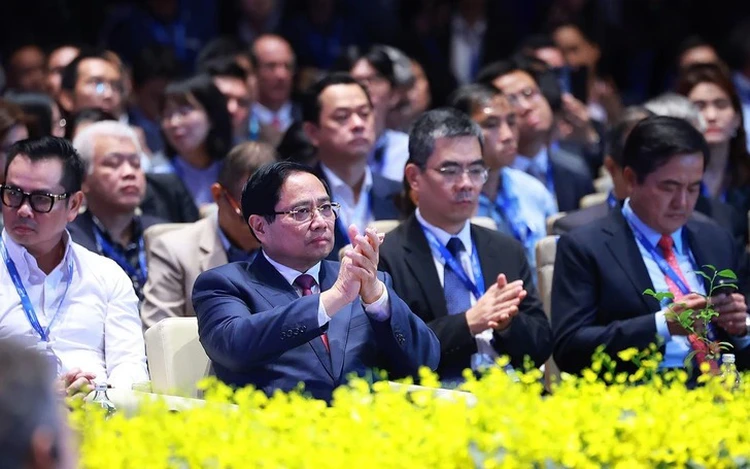
Vietnam’s Prime Minister Pham Minh Chinh attends the CEO 500 - Tea Connect program, part of the 2025 Autumn Economic Forum, in Ho Chi Minh City, November 25, 2025. Photo: Vietnam News Agency
He delivered the appeal on Tuesday at the CEO 500 Tea Connect program, which brought together city leaders and senior executives from major domestic and foreign companies.
The event, part of the 2025 Autumn Economic Forum scheduled for November 25-27, focused on how Ho Chi Minh City can position itself as a global megacity in the digital era.
Chinh thanked international partners and businesses for what he described as consistent and practical contributions in recent years, saying their ideas help guide Vietnam toward its two long-term goals: becoming an upper middle-income country by 2030 and a developed, high-income socialist nation by 2045.
He noted that nearly 40 years after Doi Moi (renovation), Vietnam now has diplomatic ties with 194 countries, maintains comprehensive strategic partnerships with all five permanent members of the United Nations Security Council as well as many G20 nations, and has signed 17 free trade agreements covering more than 60 countries.
From a war torn and impoverished nation, Vietnam has grown into a developing economy with a GDP of about US$510 billion, a per capita income of roughly $5,000, and a place among the top 20 countries in global trade and investment attraction.
During the forum, participants were briefed on Ho Chi Minh City’s development strategy for 2026 to 2030 with a vision toward 2045.
The plan outlines major projects and cooperation initiatives aimed at transforming the southern metropolis into an international hub.
Chinh identified five priority growth pillars for the city: high-tech industry; logistics linked to seaports, airports, and free trade zones; a future international financial center; tourism and cultural industries; and advances in education, healthcare, and science and technology.
He said progress in these areas will depend on sustained international cooperation and support in five key fields: capital mobilization; digital infrastructure; institutional transparency and competitiveness; high-quality workforce development; and smart, efficient urban governance.
Alongside capital and infrastructure needs, Chinh stressed the importance of streamlining regulations, strengthening competitiveness and creating better opportunities for investors.
He also underlined the central role of people in policy making, development and innovation, saying that effective institutions and infrastructure ultimately depend on human capacity.
Chinh said he believes Ho Chi Minh City, as a modern and dynamic center of economy, finance, trade, science, technology and innovation, will achieve major breakthroughs and stand alongside other leading global cities.
He reaffirmed that Vietnam places a high priority on macroeconomic stability, inflation control, balanced economic management and sustainable growth.
Chinh urged international partners, investors and businesses to continue working with Vietnam in the spirit of listening, understanding, sharing a common vision, acting together and celebrating shared progress.
He concluded with a message to the global business community: Your success is Vietnam’s success.


Max: 1500 characters
There are no comments yet. Be the first to comment.